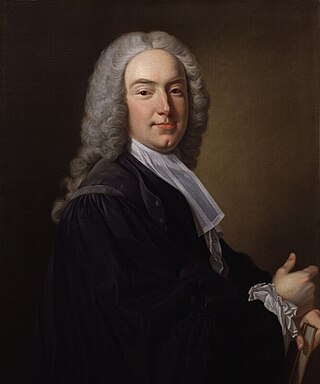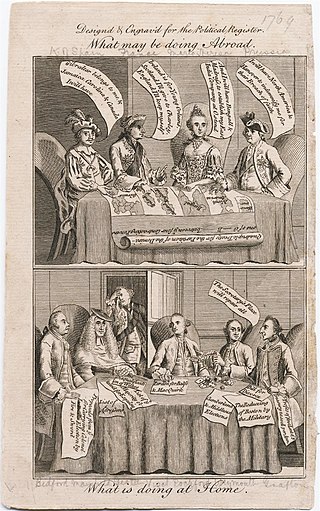Letters of Junius (or Junius:Stat nominis umbra) is a collection of private and open letters critical of the government of King George III from an anonymous polemicist (Junius) claimed by some to be Philip Francis (although Junius' real identity has never been verified), as well as other letters in-reply from people to whom Junius had written between 1769 and 1772. The collection was published in two volumes in 1772 by Henry Sampson Woodfall, the owner and editor of a London newspaper, the Public Advertiser . [1] [2]
The collection includes 69 letters, 29 to the Printer of the Public Advertiser originally intended for public readership, with the remaining 40 to individuals, then made public. It included letters written by Philo Junius, who, some say, was Junius himself.
Several unauthorised editions were published before 1772, and many others afterwards. The 1772 Woodfall edition, however, was believed to have been arranged by Junius, and includes the opening "Dedication to the English Nation" in which Junius expresses his desire to educate the public and thanks them for their support. In the "Preface" he grants ownership and copyright of the letters to Woodfall.
Woodfall was tried in 1770 before Lord Mansfield for printing the Letters; the contention of the Attorney-General, de Grey, was that it constituted seditious libel. The jury returned a verdict of "guilty of printing and publishing only." Woodfall was defended by Serjeant Glynn and Mr. Lee; the Solicitor-General was Thurlow. Mansfield decided in favour of a mistrial, and Woodfall went free. [3] John Almon, a bookseller, [4] and John Miller, a printer of the London Evening Post , [5] were tried at the same time, only for Miller to be found not guilty; Almon was convicted, but seems to have had no punishment. Separate trials were afforded all three.
In the following year the Speaker of the House ordered the apprehension of John Wheble on charges of publishing the debates in Parliament, but the charges were dismissed by John Wilkes in his capacity as alderman/magistrate. Miller was then in turn prosecuted for this offence, but the Lord Mayor of London, Brass Crosby, dismissed the charges, following the lead of Wilkes.

John Wilkes was an English radical journalist and politician, as well as a magistrate, essayist and soldier. He was first elected a Member of Parliament in 1757. In the Middlesex election dispute, he fought for the right of his voters—rather than the House of Commons—to determine their representatives. In 1768, angry protests of his supporters were suppressed in the Massacre of St George's Fields. In 1771, he was instrumental in obliging the government to concede the right of printers to publish verbatim accounts of parliamentary debates. In 1776, he introduced the first bill for parliamentary reform in the British Parliament.
This article contains information about the literary events and publications of 1769.

John Horne Tooke, known as John Horne until 1782 when he added the surname of his friend William Tooke to his own, was an English clergyman, politician, and philologist. Associated with radical proponents of parliamentary reform, he stood trial for treason in November 1794.

William Murray, 1st Earl of Mansfield, PC was a British barrister, politician and judge noted for his reform of English law. Born to Scottish nobility, he was a member of the Scottish Clan Murray and was educated in Perth, Scotland before moving to London at the age of 13 to take up a place at Westminster School. He was accepted into Christ Church, Oxford, in May 1723, and graduated four years later. Returning to London from Oxford, he was called to the Bar by Lincoln's Inn on 23 November 1730, and quickly gained a reputation as an excellent barrister.
Junius was the pseudonym of a writer who contributed a series of letters to the Public Advertiser, from 21 January 1769 to 21 January 1772. The signature had been already used, apparently by him, in a letter of 21 November 1768. These and numerous other personal letters were not included in his Letters of Junius collection, published in 1772.
Henry Sampson Woodfall was an English printer and journalist. He was born and lived in London.

Sir Philip Francis GCB was an Irish-born British politician and pamphleteer, thought to be the author of the Letters of Junius, and the chief antagonist of Warren Hastings. His accusations against the latter led to the impeachment of Warren Hastings and Elijah Impey by Parliament. He belonged to the Whig party.
John Almon was an English journalist and writer on political subjects, notable for his efforts to secure the right to publish reports on the debates in Parliament.
Junius was the pseudonym of a writer who contributed a series of political letters critical of the government of King George III to the Public Advertiser, from 21 January 1769 to 21 January 1772 as well as several other London newspapers such as the London Evening Post.

John Glynn Serjeant-at-law of Glynn (1722–1779) was an English lawyer and politician who sat in the House of Commons from 1768 to 1779. Glynn was born to a family of Cornish gentry. He inherited his father's estate at Glynn in the parish of Cardinham, Cornwall, on the deaths of his elder brother and his nephew.

William de Grey, 1st Baron Walsingham PC KC, was a British lawyer, judge and politician. He served as Lord Chief Justice of the Common Pleas between 1771 and 1780.

William Woodfall was an English printer, publisher and Parliamentary reporter.
The Public Advertiser was a London newspaper in the 18th century.
John Debrett was an English publisher and compiler. His name has become associated with reference books.

John Shebbeare (1709–1788) was a British Tory political satirist.

The Massacre of St George's Fields occurred on 10 May 1768 when government soldiers opened fire on demonstrators that had gathered at St George's Fields, Southwark, in south London. The protest was against the imprisonment of the radical Member of Parliament John Wilkes for writing an article that severely criticised King George III. After the reading of the Riot Act telling the crowds to disperse within the hour, six or seven people were killed when fired on by troops. The incident in Britain entrenched the enduring idiom of "reading the Riot Act to someone", meaning "to reprimand severely", with the added sense of a stern warning. The phrase remains in common use in the English language.
Andrew Bent was a printer, publisher and newspaper proprietor, active in Australia. He established the first successful newspaper in Tasmania, was the first Australian newspaperman to print a newspaper free from government control, and the first Australian printer to be imprisoned for libel.

Sir Richard Aston was an English judge who served as King's Counsel and Lord Chief Justice of the Court of Common Pleas in Ireland. Aston worked to reform law practice, specifically to change the process in which bills of indictment were issued without the examination of witnesses. After leaving his post in Ireland, he joined Lord Mansfield's court.
Sir Sidney Stafford Smythe, PC was an English judge and politician.
George Woodfall (1767–1844) was an English printer.
{{cite book}}: |work= ignored (help)